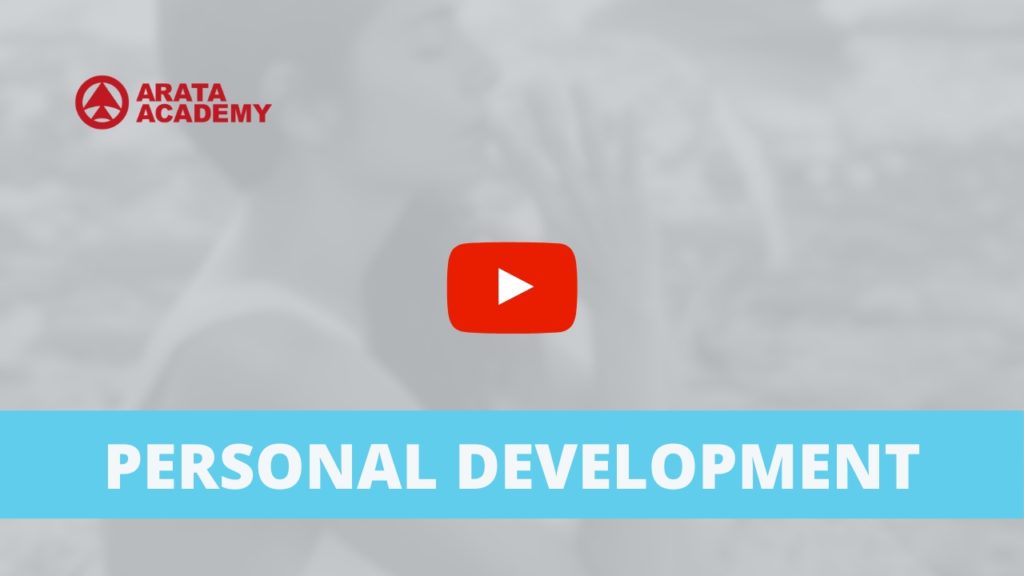Hello! Seiiti Arata. Today, we’re going to think about a key concept of personal development that’s been misinterpreted in mainstream media and cause a lot of problems in peoples’ lives. “Get out of your comfort zone.” Almost every motivational speech that we come across lately DEMANDS that you do this. You MUST get out of your comfort zone. Putting these sorts of ideas into peoples’ heads can cause a lot of irreversible problems for them.
1. Find out what your comfort zone is.
Get yourself a pen and paper. Write down all the goals you’re willing to achieve. For each of the goals that you write down, list all the actions you need to do to achieve them. Next, highlight the actions you can’t do right now. These are the things that are out of your comfort zone. This is where your growth will happen. The idea behind getting out of your comfort zone is that you should strive to achieve the things you can’t achieve today.
Think about it: when you study, do you sit down and study the same material every day? When you’ve got a bit of spare time, do you always do exactly the same things? Do you go to the same places? With the same people every time? When you work, do you face different challenges? Or do you have a routine? Does your work involve repetitive actions that could easily be done by a robot, the only difference being that the robot would do it cheaper, faster, and more efficiently?
Are you really making conscious choices? Or are you just doing things that you already know how to do because it’s easier for you?
2. When you’re comfortable, your performance suffers.
When you stay inside your comfort zone, you tend to relax. You find yourself repeating tasks. When something out of the ordinary happens, you don’t know what to do.
Making sure you’re always performing at your best is like swimming against a current. Imagine for example, if you were to learn a foreign language, but then go years without speaking it. You’d find that when you tried to speak it, it’ll be much harder to do.
We should all consciously look to grow and improve ourselves. A lot of studies suggest that our performance tends to get WORSE as time goes on. A study published in the BMJ noted that patients treated by older doctors ended up being more likely to die. This goes totally against the common idea that the best person is always the oldest doctor who has the most experience. This isn’t necessarily true. It also goes against the assumption that you’re unlucky if you get treated by a newly trained doctor.
A way to explain the results of this study could be that doctors tend to have super sharp skills by the time they finish their training. The residency is undoubtedly the most intense period of their entire career. New doctors treat all kinds of cases during their training and because of this, they rely on objective and guaranteed findings of evidence-based medicine. Basically, all of this information is new in their heads and fresh for them to use. In medicine, just like in any other professions, if you’re not constantly updating your skills and knowledge, you’ll get left behind. A true professional aims to learn something new every day. They make a deliberate effort to improve themselves and their performance.
3. Make your comfort zone bigger.
You don’t have to leave your comfort zone, just make it bigger. In other words, expand your horizons. Learn new skills. Take on bigger challenges. Meet new people. Become a better person.
What’s the difference between getting out of your comfort zone and making your comfort zone bigger? If I were to suddenly decide to try and survive alone in the middle of the forest, it’s very likely that I’d never make it back alive. I don’t have any survival training, I don’t know how to start a fire, I don’t know how to find food in the wild. In this case, I got out of my comfort zone and came to a tragic end.
It’d be a different story if I went from a survival training class with good instructors and equipment. In this case, I’d just be expanding my comfort zone.
4. Expand your comfort zone step by step.
Let’s pretend that you’re learning a new language. Currently, you can understand kids cartoons in the language you’re learning because they use simple vocabulary. This would be your comfort zone. However, in order to increase your comfort zone, you wouldn’t want to jump straight into a university lecture in the language you’re learning. It’s unrealistic for now. As a next step, you could study the language a little more, maybe hire a tutor, and set your next goal as something like being able to understand an episode of a sitcom in the target language, one that has a little bit more complicated vocabulary.
First you have to understand what level you’re at. Understand what level is completely out of grasp. Use this information to find a middle ground, find a level that allows you to expand your horizons with just a little bit of effort and help from others.
Once you’ve taken this step, you can move on to the next. Here’s another example: if you were to start running as a hobby, you shouldn’t try to run a 42-kilometer marathon in the first week. It’s something that your body simply won’t be able to do. So, let’s say that you go for a run, and find that you can comfortably run 3 kilometres before getting too tired to carry on. This is your comfort zone. Therefore, running four kilometres tomorrow could be a great challenge to help you move on to the next step.
Keep in mind that if you feel like the first step you’re taking is too complex or difficult, it’s useful to try and find a way to simplify the first step. This was one of the first things we spoke about in episode 01 of the series Hello! Seiiti Arata [arata.se/oi01]
5. Become more balanced.
Look at the common pattern in speeches about getting out of your comfort zone. There always seems to be a motive fuelled by resentment. I myself have made this kind of mistake in the past. I had different weaknesses and vices and I found that I was very dissatisfied. Because of this, I also adopted the idea of leaving my comfort zone as a way to change myself.
The problem is that trying to get out of your comfort zone can lead you to the other extreme.
Look at your group of friends. You probably know someone who used to be sedentary, overweight, were heavy smokers, or had some sort of addiction… and then out of nowhere, they became obsessed with leading a healthy lifestyle. At times, they can get a bit annoying, and always have something to say about the way you live your life. They comment on what you eat, or what time you get up. They went from one end of the spectrum to the other.
When you leave your comfort zone you run the risk of becoming a bit bitter about who you were yesterday. This is one of the biggest problems these days. It’s the lack of self-love. Lack of acceptance. Lack of affection towards yourself. Lack of self-forgiveness.
This lack of self-love can affect you on an identity level. It can give rise to several limiting beliefs that can harm you. You might start sabotaging yourself whenever you face any big challenges. Judging yourself too harshly is a big problem. This problem risks affecting many other dimensions of your life and the choices that you make.
It’s easy to get the wrong end of the stick when you hear the term “get out of your comfort zone!” – it might even influence you to do something that could cause you damage. You want to grow. The personal development that you’re seeking starts with a smart and sustainable plan. There’s a very delicate balance that needs to be found: on one hand, you want to continue to improve yourself. On the other hand, you can’t be too hard on yourself. The way you treat yourself underpins your notion of self-identity. Healthy personal development creates sustainable improvements. In the Personal Development course, you’ll have access to a solid framework that’ll guide your growth process – visit https://arata.se/personaldevelopment

